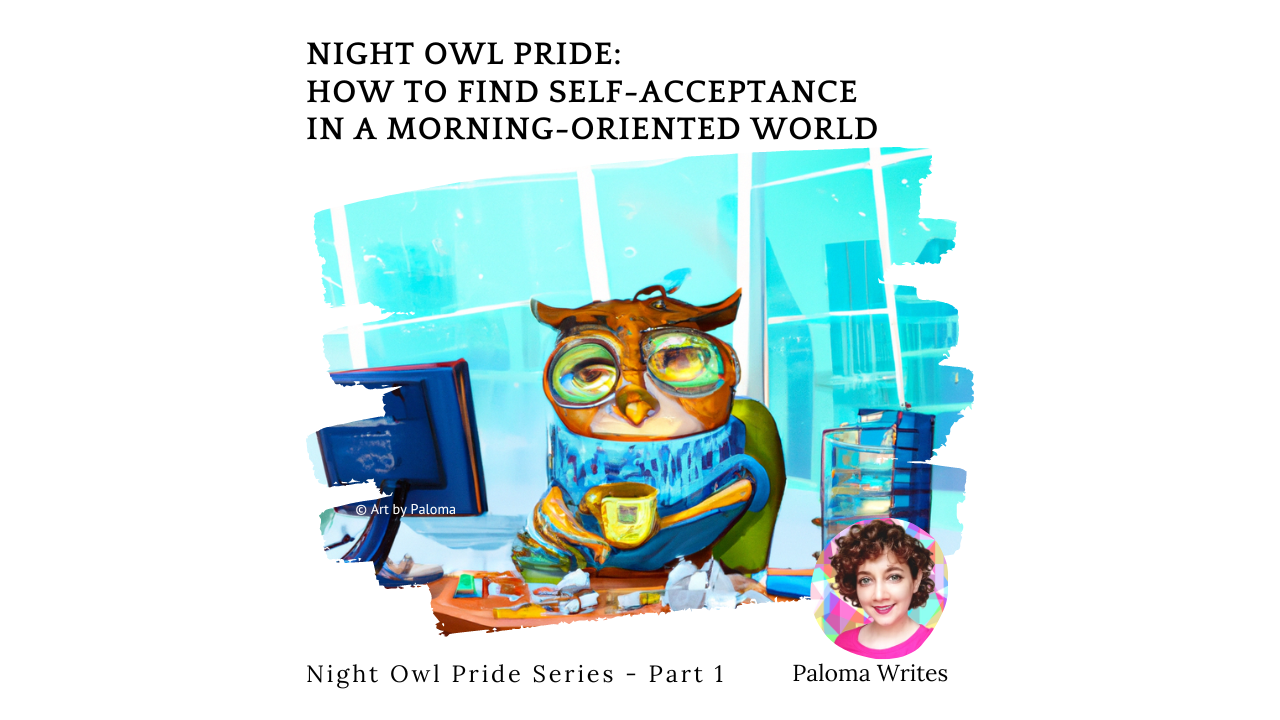Night Owl Pride Series - Part 1
I am Paloma. I’m a night owl and proud of it. After a lifetime of trying to turn into a morning person, I decided to work with my natural rhythm rather than fighting against it. I’m now in radical acceptance of my natural chronotype.
A chronotype is one’s natural inclination towards staying up late or waking up early. It’s like your own internal clock that dictates when you feel most alert and productive.
If you're nocturnal like me, you may have noticed that you feel more energized at night than during the day. This is because your internal biological clock is set to later hours than that of early risers. In other words, you have a delayed sleep-wake phase. There’s nothing wrong with that. It’s genetic. Yet, night owls often face negative attitudes and stereotypes, especially in a society that values early risers and morning productivity.
I am often shamed for not being a morning person. The first step I took toward self-acceptance was to stop shaming myself. Here are some examples and suggestions for how to respond when being shamed by others.
1. Being called lazy or unmotivated: Morning people often assume that night owls are sleeping in and wasting the day. However, research has shown that night owls may be just as productive as morning people, but at different times of the day.
How to respond: Point out that productivity and creativity are not limited to morning hours, and that different people have different natural rhythms. You might also suggest that you would be more productive and efficient if you were allowed to work during your peak hours.
2. Being shamed for not trying hard enough: I’m often told to "just go to bed earlier". I’ve received this advice over and over from my well-meaning morning-person friends. Others (who are not so well-meaning) have told me that I lack discipline and determination. Research has shown that genetics largely determines chronotype and is not easily changed (Jones et al., 2020). I stopped trying to change something that’s determined by genetics.
How to respond: Explain that your sleep patterns are largely beyond your control and that trying to force yourself to sleep earlier is likely to be counterproductive. It’s like telling a morning person to try staying up until later than their bedtime.
3. Being shamed for skipping morning social events: Many social and professional events are scheduled for early in the morning, which can be difficult for night owls. This can lead to feelings of isolation, exclusion, and missed opportunities. I normally say no to 8 am breakfast meetings, or sunrise beach walks.
How to respond: Explain that your natural sleep patterns make it difficult to attend early-morning events, and suggest alternative times that would work better for you. You might also point out that accommodating different chronotypes can lead to better outcomes for everyone involved. I tell my friends that it’s okay for them to go to a morning meetup without me because I unconditionally accept and support their chronotypes. I did have some FOMO (fear of missing out) before but not so much anymore.
How do you find out your chronotype? One way is to take a chronotype test, which can provide you with insight into your sleep patterns and energy levels throughout the day.
Whether you’re a night owl or an early bird, it’s important to honor your natural rhythm.
So which one are you? What are the things you struggle with when it comes to your chronotype?
Looking for an experienced content writer? I translate your vision into impactful words. Let’s work together!



Comments ()